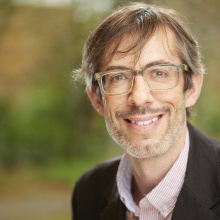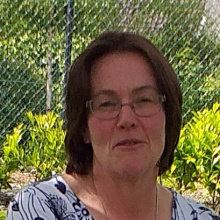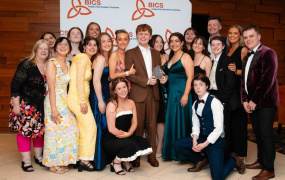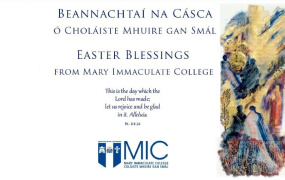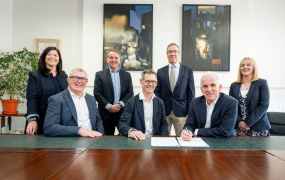Geography
About
The Geography Department was established in Mary Immaculate College in 1974. Today, the department provides geography to degree level as a major subject on the BA in Liberal Arts in both MIC and the University of Limerick (UL), as well as the BSc in Physical Education in UL. In addition, a geography elective module is provided for students on the B Ed in Primary Teaching offered at MIC.
The Geography undergraduate programme is one of the most popular, with typical enrolment in the region of 500 students.
The department currently consists of seven full-time staff members. Our facilities include a dedicated teaching and resource area, including a map library, a GIS laboratory, a sediment analysis laboratory, and two microscope laboratories.
All members of the department are research active, and provides supervision for suitably qualified candidates wishing to undertake postgraduate degrees (MA and PhD) by research and thesis.
Subject Overview
Undergraduate
Geography is concerned with both the natural and the cultural environments created on the earth’s surface and with the inter-relationships between them. It has links with a wide range of other disciplines, and is a subject with enormous contemporary relevance in a world facing challenges such as globalisation, increasing socio-spatial inequality, natural resource depletion, environmental degradation, climate change, and large-scale international migration and refugee flows. The aim of the MIC geography programme is to give students a holistic understanding of these issues, and the links between them, through the critical application of geographical concepts and methods of analysis.
The Geography programme includes modules in both physical and human geography. In physical geography, we aim to provide students with a sound understanding of the processes at work in the natural world, and of environmental change in both past and present times. The human geography programme focuses on the relationship between human societies and their environment, and how this relationship changes through time and across space.
A balanced approach to instruction and assessment is adopted. As well as lecture courses, learning is fostered through laboratory work (part of which is computer-based), tutorials, seminars, and group work. There is a strong emphasis on fieldwork, and you will have an opportunity to participate in short field-trips to local destinations, as well as an extended residential field-trip which may be in Ireland or abroad. Students wishing to be registered with the Teaching Council as post-primary geography teachers are advised to discuss module selection with their academic advisor.
See below for a list of modules in the Bachelor of Arts programme in descending order from First Year onwards. The module 'Reading the Irish Cultural Landscape' is available as an elective module to students on the Bachelor of Education programme. Note that not all modules may be offered in any given academic year.
This module will provide an introduction to the key geographical processes that are fudamental to understanding the Earth's natural, or physical, environment. The module aims to demonstrate the dynamic nature, and inter-relationships through time, of the four components of the Earth's physical systems, namely the atmosphere, the geosphere, the hydrosphere and the biosphere. The topics to be covered will therefore include the following: continents and oceans - Earth's structure and materials, plate tectonics, ocean circulation; climate and weather - atmospheric processes, global, regional and local climates; the hydrosphere - water resources and management; cycles and patterns in the biosphere - soil formation and development, terrestrial flora and fauna. Lectures will be accompained by a series of laboratory classes providing an introduction to relevant geographical skills and techniques.
This module will provide an introduction to key geographical processes and patterns. It will explore the relationship between environmental and human processes in diffferent geographical contexts. It aims to explain the nature of these interactions at the global, national, regional, and local levels. The holistic nature of geography as a discipline, and the need to understand the importance of processes in the natural environment as they relate to human occupancy and activity will constitute central themes of the module. These themes will be examined through the following topics: political systems; cultural systems and identity; land uses; demography; development and urban and regional geographies. In addition, the module will contain a skills-based component providing an introduction to cartography and map reading.
This module examines the evolution of the landscapes of Ireland and Britain, firstly in a geological context, and secondly by focussing on the role of geomorphological processes that have modified and shaped the landscape. The first part of the module will examine the major mountain building episodes and associated tectonic processes that have punctuated the geological history of the Irish and British landscapes, providing the foundations of initial landscapes. The second part of the module will proceed to investigate the earth surface processes that have sculpted and shaped these landscapes to produce the characteristic landforms that we observe today. In addition, the general geomorphological principles that determine the nature and frequency of geomorophological processes will also be discussed.
Political Geographers are ‘interested in how power relations build spaces and places and how, in turn, spaces and places mediate politics and conflict' (Flint & Taylor, 2007:4). These power relations can operate at a number of different scales from the global to national, regional and local. This module aims to enable students to identify, analyse, critique and classify models and systems of political and territorial organisation from the global to the local. This module will provide an introduction to the political geography of the world since the ending of the Second World War and the key theories and concepts which are essential to our understanding of this period. The module will investigate and analyse the relationships between political processes and the economic, cultural and social factors which shape our world.
Approaches to the study of economic geography; techno-economic paradigm shifts and the changing geographies of production; from Fordism to flexible production, the spatial impact of technological change; transnational corporations, foreign direct investment and economic globalisation; de-industrialisation and the growth of the service economy; the transformation of work and employment; new information and communication technologies and the changing geographies of services; innovation, industrial clusters and the knowledge economy.
Nature and types of geographical research; using databases and electronic journals to find previous work; secondary data sources; theory and methods of sampling; methods and instruments for social surveys; introduction to the use of basic field equipment and instrumentation; coding and inputting data; exploratory data analysis; measuring relationships; analysing qualitative data; use of topographical maps; creating thematic maps; writing a research proposal.
The module introduces students to the study of biogeography as an important and multi-disciplinary area of contemporary science linking the earth sciences and the life sciences, the influence of which has spawned a more environmental and holistic view of the world. The central focus of the module will be on explaining spatial patterns in biodiversity. Natural processes and human interaction with the environment have together produced a wide range of characteristic landscape features with a rich variety of distinctive flora and fauna reflecting natural and cultural diversity. This course will examine how the distribution of plants and animals has been moulded naturally through time, via the influence of man, and how this remarkable landscape legacy is now threatened by powerful forces of change, e.g. climate change. Two field visits as part of the GY4744 module will provide opportunities to observe unique biogeographical features and enhance students understanding of the processes and changes that shape the physical landscape.
Available as an elective module on the Bachelor of Education programme.
The aim of this module is to engage the student actively in deciphering the various clues and codes from the past that are contained within the contemporary Irish landscape. This module will focus on colonisation, settlement and subsequent landscape change, inquiring how, when and why peoples of differing cultural origins, traditions and technical abilities established new economic and social patterns, and altered the Irish landscape. The topics to be covered will therefore include the following: pre-historic Ireland, geography and archaeology; ‘celtic’ landscapes; society and settlement in the iron age; early medieval Ireland, Vikings, proto towns, the development of the early Irish church; medieval landscapes in Ireland, from Gaelic to feudal power; plantation landscapes; society and settlement in 18th century Ireland; landlords, enclosures and famine, the changing nature of the 19th century landscape.
Students can choose to do their undergraduate dissertation in a topic related to Geography in consultation with department staff.
This module will explain and illustrate approaches to the reconstruction of past environments through geological time, using evidence ranging from the well-dated and more complete palaeoenvironmental records of the Quaternary Period to the fragmentary and less well understood records dating back to the Precambrian. The module will survey the different types of evidence that can be analysed as well as the principles and techniques that are used to reconstruct past environments and detect environmental change. The main dating and chronological techniques and their limitations will also be examined. The module will highlight the importance of understanding past climate variability in order to anticipate or predict future climatic variations.
Concepts of the region and the locale; area-based or geographical development; policies, practices and innovations; the development of urban and rural territories; neighbourhood dynamics and interventions; economic processes and disparities; peripherality and deprivation; territorial competitiveness; drivers and agents of development; spatial planning; transnational and inter-territorial collaboration.
This module aims to enable students to identify and critique the key geographical characteristics of heritage and tourism management, and to understand the influence heritage and tourism have on the economic, social and cultural fabric of everyday communities and landscapes. The topics to be covered will therefore include the following: understanding heritage, concepts and methods of analysis; heritage landscapes; heritage management; heritage providers; heritage representation in areas of conflict; heritage interpretations; future role of the heritage industry; understanding tourism, concepts and methods of analysis; prospects and challenges for tourist provision, global, national and local issues; rethinking tourism impacts; economic impacts; physical impacts; social impacts; tourism planning and policy at the international and supranational level; tourism planning and policy at the national and sub-national level; sustainable tourism.
The future of the global environment is now a matter of major scientific and public importance. This module focuses on some of the more pressing environmental issues, including problems such as greenhouse-gas induced global warming, deforestation, pollution, and the loss of natural habitats, all of which have grave and often uncertain implications. The module will consider the complex and cumulative impact of people on the environment in three key areas of environmental change: (1) global climate change; (2) human-induced change on the earth surface; and (3) water resources and pollution. Using applied case studies, each aspect of environmental change will be examined in terms of the problematic symptoms, the science, the political debates and the possible scientific solutions. The module will normally incorporate two days of fieldwork.
Contemporary patterns of urban growth and development; differential urbanisation and the cycle of urbanisation; the size distribution of urban settlements; specialisation and diversity in the urban economic base; the distinctive city; world cities and transnational urban networks; models and patterns of land value and land use; household location and the socio-spatial structure of urban areas; social polarisation and residential segregation in the post-Fordist city; the urban role of government; land use planning, zoning and development control; urban renewal and regeneration; the sustainable city; governance and jurisdictional fragmentation in the contemporary metropolis.
This module explores the concepts of development and underdevelopment, and evolving perspectives on both concepts. Case studies are utilised to examine issues, challenges, approaches and strategies in developing societies, in respect of issues such as environmental conservation, natural hazards, resource management, land use, food security, infrastructure, health, education, governance, economic development, security, welfare and human rights. The module explores how climate change, globalisation and other factors emanating from ‘developed’ societies impact on the majority world. The module looks at strategies and initiatives that seek to promote sustainable development, and it considers actual and possible solutions to the problems associated with underdevelopment, as well as the roles of citizens, NGOs, educators, international organisations, governments and the churches in promoting well-being and development.
Oceans cover approximately seventy percent of the Earth’s surface, regulating our climate and maintaining our atmosphere. This module will investigate the broad scale features and dynamics of the Earth’s oceans emphasising the role of basic scientific principles in helping to understand the geological, chemical, physical, and biological processes that occur in ocean environments. The module will explore a range of global processes such as the origin and history of the oceans; ocean chemistry and circulation; ocean currents and marine ecosystem dynamics and discuss their impacts on local and regional issues such as coastal erosion and management of fisheries.
This module aims to provide intensive training in a wide range of geographical techniques through the format of a residential field course at an appropriate location. In addition students will engage in the planning and execution of individual and group research projects. The module will focus on interpreting both the human and physical landscapes of an appropriate location (either on the island of Ireland or overseas) and will cover some of the fundamental aspects associated with field work such as, but not exclusive to: field observations and accurate recording in a field notebook; qualitative and quantitative data collection techniques (e.g. archives, census data, interviews, survey questionnaires, photography, transects, surveying) and data analysis, interpretation and presentation. The topics that are covered in any given year will vary according to the staffing arrangements within the department.
Through the interdisciplinary framework of political ecology, this module will query the relationship between economics, politics and nature. Drawing on case studies from around the world, the module will explore such themes as: the unequal distribution of environmental resources, risks and vulnerabilities; environmental ideology and discourse; environment, livelihoods and politics; energy and natural resource management; nature conservation; agricultural production; environmental justice; and urban political ecologies. By focusing on issues of power and decision-making in securing access to resources, as well as analysing discourses surrounding the production and representation of scientific knowledge, students will begin to understand how political ecology can be used to inform policy makers and organisations of the complexities surrounding environment and development, and thereby to contribute to better environmental governance.
Postgraduate
The Department of Geography provides a supportive environment for postgraduate students pursuing both MA and PhD degrees by research and thesis. Financial support is available by means of Departmental Assistantships, and in addition postgraduate students will be supported to apply for external funding, Irish Research Council Scholarships. The department has its own accommodation for postgraduate students, located in Gerard House in close proximity to the geography laboratories.
Supervision is available in the following specialist areas:
Human Geography:
- Regional and local development
- Society and settlement in medieval and 17th century Ireland
- Social and spatial change in nineteenth century Irish cities
- Urbanisation, urban development and spatial planning in Ireland
- Sustainable development, particularly socio-technical transitions, low-carbon development and challenges of low carbon economy for urban and coastal communities
- Urban socio-spatial variation, with particular focus on housing, segregation and social deprivation
Environmental Geography:
- Environmental reconstructions and environmental change
- Ecological responses
- Palaeolimnology, limnology and catchment based studies;
- Marine micropalaeontology
- Palaeoceanography and natural climate variability of the Mediterranean Sea
- Urban ecosystem services
- Igneous and sedimentary geology
- Environmental remote sensing
Staff
Research
The Department of Geography at Mary Immaculate College is a compact yet dynamic department within the institution’s Faculty of Arts. The department has an excellent research profile with a strong record in securing external research funding and publishing research findings in leading international journals. Members of the department have held leadership roles in professional associations, including the Regional Studies Association, the Remote Sensing and Photogrammetry Society, the Irish Quaternary Association and the Geographical Society of Ireland. All staff members are research active, and have successfully supervised postgraduate research at Master's and/or PhD level. Faculty members and postgraduate students within the department form a strong and mutually supportive community of scholars, into which new postgraduate students are integrated.
Postgraduate Research Scholarships 2025-26
Applications are now open for a range of postgraduate research scholarships at the Department of Geography, Mary Immaculate College, Limerick.
- MIC Doctoral Award: fee waiver + €12,600 annual stipend
- Department of Geography Postgraduate Award (TBC): fee waiver + €11,900 annual stipend
- Several other PGR awards valued at: fee waiver + €6,900 annual stipend
Scholarships are eligible for Masters (MA by research) or Doctoral (PhD) projects, with funding provided for up to three years (plus part-funding provided in the fourth year for the Geography Postgrad Award) and fees waived for up to four years (for the PhD programme).
The deadline for applications is 12:00 (Irish time) on 25 April 2025.
Further information on the PGR scholarship schemes is available here.
Applicants are encouraged to contact prospective supervisors (see details below) at the earliest opportunity. For general enquiries, contact Head of Department, email: Paul.Aplin@mic.ul.ie.
Department of Geography
The Department of Geography at Mary Immaculate College is a compact yet dynamic department within the institution’s Faculty of Arts. The department has an excellent research profile with a strong record in securing external research funding and publishing research findings in leading international journals. Members of the department have held leadership roles in professional associations, including the Regional Studies Association, the Remote Sensing and Photogrammetry Society, the Irish Quaternary Association and the Geographical Society of Ireland. All staff members are research active, and have successfully supervised postgraduate research at Masters and/or PhD level. Faculty members and postgraduate students within the department form a strong and mutually supportive community of scholars, into which new postgraduate students are integrated.
Staff research interests
Remote sensing of environmental distributions, with particular focus on spatial and temporal scales of observation, methods of land cover characterization, and application to ecological problems, specializing in forest environments.
Contact Paul.Aplin@mic.ul.ie for informal discussion about PGR project ideas.
Human-environment relations; political ecology; energy geographies; livelihoods; geographies of illicit networks and trade.
Contact Julian.Bloomer@mic.ul.ie for informal discussion about PGR project ideas.
Society and settlement in medieval and 17th century Ireland; social and spatial change in 19th century Irish cities, with particular reference to Limerick city; geographies of death and burial in 18th and 19th century Ireland; historical archives & cartography.
Contact Helene.Bradley@mic.ul.ie for informal discussion about PGR project ideas.
Marine micropalaeontology; Quaternary planktonic foraminifera; Palaeoceanography and natural climate variability of the Mediterranean Sea.
Contact Angela.Hayes@mic.ul.ie for informal discussion about PGR project ideas.
Water Quality; River & Lake Catchments; Sediment Reconstructions (Palaeolimnology); Quaternary Environments; Rivers Trusts; Citizen Science.
Contact Catherine.Dalton@mic.ul.ie for informal discussion about PGR project ideas.
Sustainable development, particularly socio-technical transitions, low-carbon development and challenges of low carbon economy for urban and coastal communities. My work is informed by environmental economic geography with a focus on socio-spatial differentiation of transition processes.
Contact John.Morrisey@mic.ul.ie for informal discussion about PGR project ideas.
TERMS AND CONDITIONS
The scholarship consists of a stipend of €12,600, €11,900 or €6,900 per annum, and a full waiver of tuition fees (up to the value of €6,425). The fee waiver will be linked to any increase in fees over the term of the Scholarship. The PhD programme is for a maximum of four years, and the Masters award for a maximum of two years, commencing in September 2025 or January 2026. The continuation of the award is subject to annual review of the post-holder’s progress under MIC’s procedures for review of postgraduate research. For PhD, applicants must hold a Masters qualification in Geography or a cognate discipline. In exceptional circumstances, applicants with a first class honours Bachelors degree may be considered. For MA, applicants must have at least a 2:1 qualification in a relevant Bachelors degree. Selection will be by a board consisting of members of the Department of Geography, Mary Immaculate College, and will be based on the written application and interview.
The Geography scholarships appointment and management processes follow the overall MIC approach – full terms and conditions available here.
Links
Our Research Partners and Affiliates
- International Centre for Local and Regional Development
- National Institute for Regional and Spatial Analysis
- All-Island Research Observatory
Irish Maps and Statistics
- Ordnance Survey of Ireland
- Ordnance Survey of Northern Ireland
- Central Statistics Office - Ireland
- Northern Ireland Statistics and Research Agency
Professional Associations/Learned Societies
- The Association of Geography Teachers of Ireland
- Geographical Society of Ireland
- Irish Quaternary Association
- Irish Branch of the Regional Studies Association
- European Geosciences Union
- American Geophysical Union
- International Union for Quaternary Research
- Micropalaeontological Society
- Regional Studies Association
- The Royal Geographical Society with the Institute of British Geographers
- Association of American Geographers
- About
- Subject Overview
- Staff
- Research
- Postgraduate Research Scholarships 2025-26
- Links



